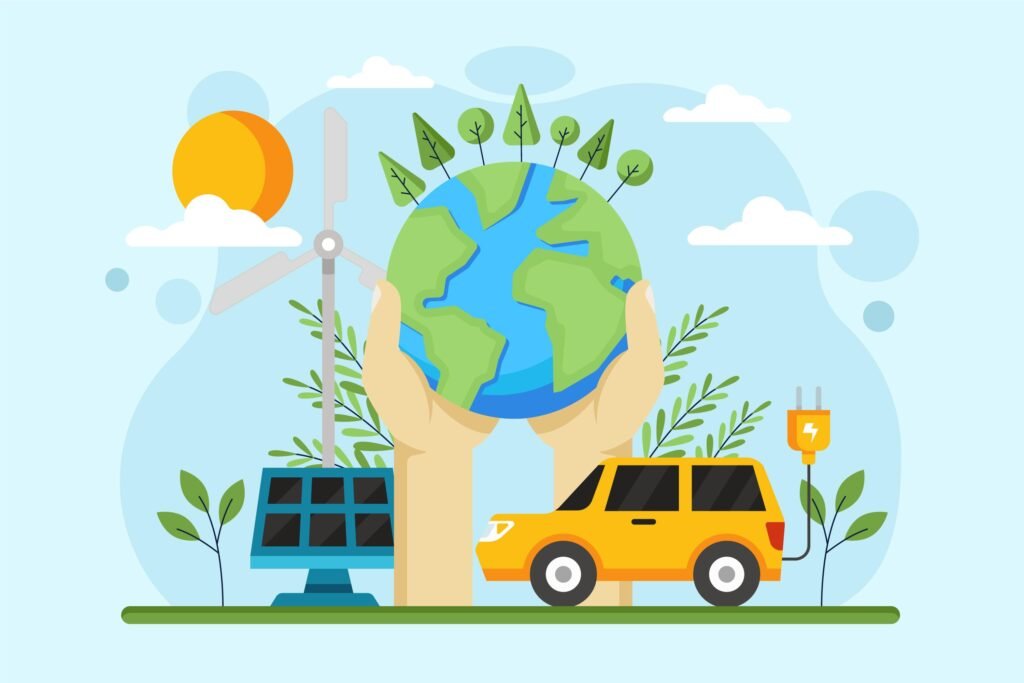Efforts to switch fuel from conventional vehicles to electric vehicles (EVs) are one of the concepts currently being discussed. Presidential Regulation No. 55 of 2019 was issued by Indonesia to promote electric motor vehicle programs. Infrastructure, regulations, and the manufacture of electric vehicle (EV)-based vehicles drive progress.
Understanding Electric Vehicles
Electric vehicles, or EVs, are passenger cars that use electric fuel. Electric motors, either wholly or in part, are used to power electric vehicles. Fully electric vehicles, electrically powered vehicles, and hybrid vehicles are three types of electric vehicles currently available. Electric vehicles have several advantages compared to vehicles that use other fuels.
Journey of Electric Vehicles in Indonesia
Here is the journey of electric vehicles in Indonesia from 1989 to 2022.
Electric Vehicles (Year 1989)
The first Indonesian-made solar-powered electric car, Widya Wahana I, was created as a result of experiments by students at the Sepuluh Nopember Institute of Technology in Surabaya. Minister of Youth and Sports Akbar Tanjung released Widya Wahana I for trial runs from Jakarta to Surabaya on November 19, 1989.
Since November 30, 1989, the first Solar Power Electric Vehicle (MLTS), made by students from the Faculty of Electrical Engineering, Trisakti University in Jakarta, has been available on Campus A, Trisakti University.
Electric Vehicles (Year 1998)
Marlip, an electric car with a target of 70% local content, was initiated by LIPI. Electric bicycles began to enter the Indonesian market with designs resembling motorcycles. Although the speed was only about 30 to 40 km/h, it could be a more environmentally friendly option.
Electric Vehicles (Year 2003)
Despite being promoted to government agencies, Chinese-made electric bicycles began to enter the Indonesian market. These bicycles come in various models, with prices ranging from IDR 3.8 million to IDR 4.8 million per unit. Both cash and credit purchases can be made by sellers.
Electric Vehicles (Year 2005)
People at the Indonesian Institute of Sciences (LIPI) created an electric vehicle called Marlip, which saved energy and did not cause pollution.
Marlip was first released in Jakarta on August 22, 2005, and had the ability to reach speeds of 40 km per hour on flat roads. Its power source was a battery, which could last for eight hours. Closed areas such as airports, ports, and golf courses were Marlip’s target areas.
On Thursday, October 27, 2005, President Susilo Bambang Yudhoyono and KH Abdullah Gymnastiar rode the energy-saving Marlip car. The President declared 2005–2006 as the year of science inauguration in Indonesia.
Electric Vehicles (Year 2007)
In February 2007, PT Honoris Indonesia, operated by PT Modern Photo Tbk (Modern Group), launched E-Moto, an electric motorcycle. At the parking lot of the Ministry of Industry building, from June 6 to June 8, 2007, E-Moto conducted driver testing.
Electric Vehicles (Year 2008)
On Friday, July 11, 2008, PT Krama Yudha Tiga Berlian Motors (KTB) launched the i-MiEV electric vehicle, known as the Mitsubishi Innovative Electric Vehicle, at the 2008 Indonesia International Motor Show.
Electric Vehicles (Year 2011)
The PT Juara Bike or SELIS factory is located in Cikupa, Banten. SELIS is an electric vehicle brand with various types of electric cars, electric bicycles, and electric motorcycles.
Electric Vehicles (Year 2012)
In early March 2012, Dahlan Iskan, the Minister of State-Owned Enterprises, announced a national electric car development program and invited the Indonesian people to participate. Dahlan Iskan selected five youths who might become Indonesia’s lightning sons from many who answered: Mario Rivaldi, Dasep Ahmadi, Ravi Desai, Danet Suryatama, and Ricky Elson. Dahlan Iskan then began to prepare a national electric car with them.
In the National Electric Car Research Program (Molina), BPPT, Batan, LIPI, PT LEN, PT Pindad, the University of Indonesia (UI), Bandung Institute of Technology (ITB), Sebelas Maret University (UNS), Gadjah Mada University (UGM), Sepuluh Nopember Institute of Technology (ITS), and the national electric vehicle manufacturer association are members of the national electric motor vehicle consortium.
On Thursday, November 1, 2012, in Bandung, West Java, the electric car Kujang 193 was launched by students from the Department of Mechanical Engineering, Universitas Pasundan. This electric car can reach speeds of up to 60 km/h.
Electric Vehicles (Year 2013)
Danet Suryatama, an ITS alumnus who has an electric car factory in the United States, developed the Tucuxi electric car. Dahlan Iskan underwent a 1,000 km vehicle test. During the vehicle test, Dahlan Iskan had an accident on January 5, 2013, in Magetan, East Java. The journey was stopped because the car was severely damaged.
On May 20, 2013, an environmentally friendly public transportation prototype called the Hevina electric minibus was launched in Yogyakarta by the Ministry of Research and Technology. Tourists can tour around Yogyakarta with this LIPI-made electric bus.
At the end of July 2013, TDR-Zero, an electric motorcycle made by TDR International and Zero Electric, was launched.
During the Asia-Pacific Economic Cooperation (APEC) meeting held in Bali from October 5 to 8, 2013, Dahlan Iskan and Ricky Elson showcased the Selo electric car (sports type) and Gendhis (mpv type) electric car.
At the end of 2012, students from the Department of Mechanical Engineering, Brawijaya University in Malang, created the Optima 1 electric car. Brawijaya University students made the third-generation electric car. Apatte was the first car (November 2012), and Aristo was the second car (May 2013).
On November 28, 2013, the electric-powered Cikal Cakrawala EV car was showcased at the STEI ITB Innovation Day event at the West Hall of the Bandung Institute of Technology (ITB), West Java. The car, made by 16 ITB students, uses a 20AH battery and can reach speeds of 30 km/h.
Electric Vehicles (Year 2014)
In Jakarta, on April 29, 2014, students from the Surabaya Institute of Technology (ITS) launched two electric cars, Ezzy ITS I and Ezzy ITS II. Ezzy 1 and Ezzy 2 participated in the Tour de Java from Jakarta to Surabaya from May 2 to May 6, 204, covering a distance of 800 kilometers.
On Wednesday, October 15, 2014, the Sang Surya Eco Energi team from the Faculty of Engineering, Muhammadiyah University of Malang (UMM) in East Java (East Java), prepared electric and diesel cars to participate in the 2014 Indonesia Energy Marathon Challenge (IEMC), which took place from October 16 to 19 in Surabaya, East Java.
Three out of four cars made by UMM passed the IEMC 2014: Bismillah Porto (electric prototype), WOR 64 (urban diesel), and Surya Eco 3.
At the JIExpo Kemayoran, Central Jakarta, the Selo and Gendhis electric cars were again showcased at the 2014 Indonesia International Motor Show.
Electric Vehicles (Year 2015)
In Surabaya, on Monday, September 14, 2015, the solar-powered electric car Widya Wahana V was created by students from the Sepuluh Nopember Institute of Technology (ITS).
The car will participate in the 2015 World Solar Challenge to be held in Australia in October 2015. The road from Darwin to Adelaide is 3,000 kilometers long.
Electric Vehicles (Year 2016)
On Tuesday, May 3, 2016, the Gesits electric motorcycle prototype was launched at the Sepuluh Nopember Institute of Technology (ITS) in Surabaya, East Java. The automatic scooter was projected to be mass-produced in 2017, with a price of around IDR 15 million per unit.
A partnership with Garansindo Group, a premium car brand company, resulted in the downstreaming of ITS research. “Gesits” stands for Garansindo Electric Scooter ITS.
On Wednesday, August 10, 2016, students from SMK Muhammadiyah 1 Imogiri tested a hybrid formula car made by Minister of Education and Culture Muhadjir Effendy. The car was completed in March 2016 and can be powered by premium fuel and electricity.
In mid-April 2016, Sebelas Maret University (UNS) Solo launched electric bicycles as an implementation of university research. Initially, mail delivery personnel on the UNS campus used electric bicycles.
The Gesits electric scooter prototype successfully traveled 1,400 km from Jakarta to Bali.
The electric motorcycle was released for five days from Jakarta on Monday, November 7, 2016, and arrived in Denpasar, Bali, on Saturday, November 12, 2016.
Electric Vehicles (Year 2017)
In Singaraja, Buleleng, Bali, on Tuesday, January 10, 2017, students from the Mechanical Engineering Education Study Program, Faculty, and Vocational University of Education Ganesha or Undiksha launched the early models of the Ganesha 1.0 motorcycle and the electric car Ganesha Sakti.
On Thursday, November 16, 2017, the Enggang Evo 1 electric car developed by students from the Kalimantan Institute of Technology was launched in Balikpapan, East Kalimantan. This is the first electric car made by students in Kalimantan that was sent to Bandung for the 9th Indonesia Electric Car Competition.
Presidential Regulation Number 22 of 2017 concerning the National Energy General Plan (RUEN) stipulates 2,200 four-wheeled vehicles and 2.1 million two-wheeled vehicles in Indonesia by 2025. This policy benefits manufacturers and builds a system and 1,000 public electric charging stations (SPLU) by 2025.
Electric Vehicles (Year 2018)
On Saturday, March 3, 2018, PT Mobil Anak Bangsa (MAB) launched electric buses at a commercial vehicle exhibition at the Jakarta Convention Center. PT Angkasa Pura II and MAB collaborated to conduct electric bus trials at Soekarno-Hatta International Airport in Tangerang, Banten.
Sebelas Maret University (UNS) Surakarta developed batteries for electric vehicles. UNS now has a battery cell factory at the UNS Business Development Center in Solo, funded by PT Pertamina and the Ministry of Research, Technology, and Higher Education.
This factory is the only one in Indonesia. UNS produces around 1,000 battery cells for manganese cobalt (NMC), nickel cobalt aluminum (NCA), and lithium metal phosphate (LMP) types every day.
Electric Vehicles (Year 2019)
In early 2019, PT Gesits Technologies Indo will begin mass-producing the Gesits electric motorcycle. Production is carried out at the Sentul factory, located in Bogor Regency, West Java, with a capacity of 50,000–60,000 units per year. Gesits is the result of collaboration between the Sepuluh Nopember Institute of Technology, the business sector, and the Ministry of Research, Technology, and Higher Education. This vehicle is reported to have a speed of up to 100 km/h. The unit price is around IDR 20 million.
In Jakarta, on April 22, 2019, PT Blue Bird Tbk launched its latest fleet, electric-powered cars. Initially, Blue Bird operated with twenty-five BYD electric cars and four Tesla electric cars.
Maritime Affairs Coordinator Minister Luhut Binsar Pandjaitan, Minister of Energy and Mineral Resources Ignasius Jonan, Minister of Transportation Budi Karya Sumadi, Head of the Creative Economy Agency Triawan Munaf, Director of PT Blue Bird Tbk Adrianto Djokosoetono, and Noni Purnomo, President Director of Blue Bird Group Holding, all attended the launch.
At the 2019 Gaikindo Indonesia International Auto Show held at ICE BSD in Tangerang, Banten, the Nissan LEAF, a pure electric car, was showcased. Lowo Ireng Reborn, the ninth electric car developed by engineers at the Sepuluh Nopember Institute
of Technology (ITS), was launched on Thursday, July 18, 2019, in Surabaya, East Java.
Two lithium battery factories for electric vehicles were built in Central Halmahera, North Maluku, and Morowali, Central Sulawesi.
In 2019, PT Astra Honda Motor introduced the Honda PCX Electric in response to the future trend of electrification of motorcycles.
To commemorate the fifth year of electric vehicle research at the Center of Excellence for Science and Technology-Automotive Systems and Controls (PUI-SKO) ITS, the National Electric Vehicle Jamboree was attended by electric cars from ITS and other universities. The cars would stop at PT PLN offices every 100 km to recharge the batteries.
Presidential Regulation Number 55 of 2019 shows progress in reducing pollution and reducing dependence on fossil fuels. This regulation is an implementation of the government’s commitment to support the mastery of technology in the production and export of EVs.
Electric Vehicles (Year 2020)
In 2020, Hyundai Motor Company, a South Korean automotive manufacturer, began construction of an electric vehicle factory in Deltamas City, Cikarang, West Java.
PT Toyota Astra Motor (TAM) launched the Prius PHEV (Plug-in Hybrid Electric Vehicle) in early 2020. Due to the coronavirus outbreak, or Covid-19, the launch was conducted without a ceremony.
The Hyundai Ioniq, a pure electric car, was released in September 2020.
Minister of Transportation Regulation Number 65 of 2020 stipulates the change from motorcycles using internal combustion engine to battery-based electric motorcycles. More and more people own and produce electric vehicles. Initially, there were only five manufacturers, but by the end of 2020, there were 22 electric motorcycle brand holders. It is estimated that there are 10,300 electric motorcycles and 1,500 electric cars.
Two electric motorcycle brands made their debut in Indonesia in late 2020. On December 11, 2020, at the IIMS Motobike Hybrid Show in Jakarta, the first brand Volta launched two electric motorcycles.
Next is the United brand made by PT Terang Dunia Internusa (TDI) with the United T1800 type. PT TDI previously made bicycles under the United Bike brand.
Electric Vehicles (Year 2021)
On September 15, 2021, President Joko Widodo attended the groundbreaking ceremony for the construction of the first electric vehicle battery factory in Southeast Asia, HKML Battery Indonesia. Construction began at the Karawang New Industrial City Complex, Karawang Regency, West Java.
Anargya EV Mark 2.0, a racing formula car developed by the Anargya team, was launched by ITS Surabaya and will participate in the Formula Society of Automotive Engineers (FSAE) competition in Japan in September 2022.
ITS also made electric passenger cars for racing and urban cars. i-Deora is an electric SUV with a compact concept that makes it comfortable and safe for city driving, traveling out, and small off-road adventures.
In Indonesia, the concept of three-wheeled electric vehicles began to be developed. Some of them will be showcased at the end of November 2021 at the 2021 Indonesia Electric Motor Show (IEMS) in the Science and Technology Research Center (Puspitek) area of Serpong, South Tangerang.
In several electric vehicle exhibitions, three-wheeled electric vehicles (Trolis) and Bajay Selis (Balis) were made by PT Juara Bike and PT Haka Motors.
Electric Vehicles (Year 2022)
During Eid al-Fitr, PT PLN provided public electric vehicle charging stations (SPKLU) at eight rest area points along the Trans-Java Toll Road. Travelers can also use the SPKLU facilities available at PT PLN in several locations. Around 126 SPKLU are located in 97 locations in 48 cities in Indonesia.
These figures do not include SPKLU from other institutions or companies. Overall, there are around 267 SPKLU in Indonesia.
Electric Vehicles Reduce Pollution
Electric vehicles do not produce exhaust emissions during operation, thus helping to reduce air pollution and are an essential part of efforts to reduce carbon emissions. Conventional vehicles, on the other hand, use fossil fuels, emitting harmful exhaust emissions harmful to the environment.
Electric vehicles are also considered quieter during operation compared to conventional vehicles, which often make noisy sounds. This improves urban air quality and passenger comfort.
Electric vehicles have many environmental benefits, making them the best solution for reducing the adverse effects of transportation on ecosystems and urban air.






